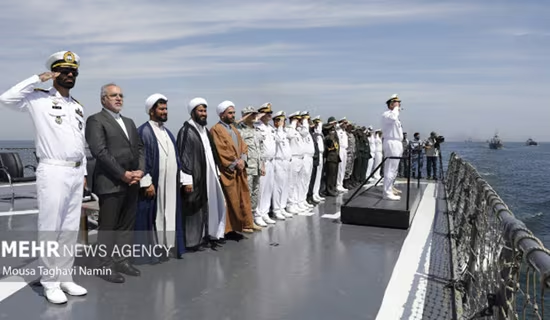In an article titled "Russo-American Bargaining Shifts to Arabic" Nezavisimaya Gazeta takes note of the assistance rendered by the Saudis and Emiratis in the recent exchange of imprisoned Russian arms dealer Viktor Bout and the American basketball star Brittney Griner. The actual exchange took place at Abu Dhabi airport in the Union of Arab Emirates. The Gulf states have declared their readiness to facilitate similar humanitarian endeavors. The article believes that the Gulf States have entered this field out of pure pragmatism.
The Gulf States have witnessed Turkey's success in staying out of the Russo-Ukraine conflict, while staying on the side of the angels by helping hammer out the grain deal allowing Ukrainian grain exports. What works for Turkey can also work for the Gulf states. A mediator, as opposed to a neutral, displays empathy rather than indifference, and can claim a reward for services rendered.
The article follows below:[1]

The Bout-Griner exchange takes place on the tarmac at Abu Dhabi airport (Source: 9111.ru)
The Persian Gulf could play a mediation role in the situation concerning US citizen Paul Whelan, convicted in Russia of espionage, following the successful exchange of the Russian, Viktor Bout for the American, Brittney Griner. This was reported to "NG" by a diplomatic source from one of the Gulf Cooperation Council (GCC) member-states, commenting on the assistance of Saudi Arabia and the United Arab Emirates (UAE) in the latest humanitarian action. Experts believe that the Middle Eastern players’ proactivity is in pursuit of a quite pragmatic goal.
The "NG" source deemed plausible the suggestion that the Persian Gulf was capable of helping in the situation with Whelan, provided the Kremlin and the White House agree on the terms of the trade. This is how he responded to the question of whether Saudi Arabia and the Emirates could consolidate their success after joint mediation efforts in the Bout-Griner deal.
The Russo-American swap occurred on December 8th, with Abu Dhabi airport serving as a transit territory. "Why not, we have good relations and open channels of communication with both countries, so I believe it’s possible," told the source. He added that the Arabian states and countries, such as Turkey, "offer a neutral platform for this kind of interaction and swaps."
For Saudi Arabia, this is not the first humanitarian initiative since February 24, 2022 [the start of the Russian invasion]. In September, a major POW exchange occurred between Moscow and Kyiv, in which the "peacemaker laurels" were shared between Saudi Arabia and Turkey, the country that hosted the Russo-Ukrainian talks this year and stimulated the passage of the so called "grain deal." Riyadh then took responsibility for returning foreign mercenaries to Ukraine, who had fought on Ukraine's side. A plane with 10 foreigners landed at the Saudi capital's airport.
A source close to Turkish officials suggested that Riyadh may not have been delegated the most pleasant part of the job: Ankara may have delicately opted out of participation in resolving the mercenaries' fate, due to their "shadowy" status, he speculated.
This was an ambiguous action in terms of reputational gain, evaluated the source.
A customary explanation for the markedly heightened enthusiasm by the Gulf countries for settling disputes between Moscow and Washington, and Moscow and Kiev, is the management of reputational risks. Bilateral ties between the US and its Arabian allies aren’t going through the easiest of times.
Washington - Riyadh contacts have entered a new crisis phase after President Joseph Biden's administration failed to persuade Crown Prince Mohammed bin Salman to coordinate his actions [with the US] on oil production.
In turn, Abu Dhabi’s policy has drawn criticism from the White House over its perceived willingness to provide a "safe harbor" to suspect (from the US Treasury’s point of view) Russian capital.
Against this backdrop, countries are trying to reassure themselves. In December, the UAE Minister of State for Foreign Trade, Thani bin Ahmad Al-Zeyoudi announced that his country intends to draw closer to Kyiv economically. "We strive to stimulate trade by removing trade barriers, customs duties, fees, standardization, etc. This will give a huge potential for doubling exports and imports," remarked the minister. Simultaneously, Abu Dhabi stressed that trade negotiations signify another key component in Emirati efforts to revitalize Ukraine’s national economy. Western business media characterized such UAE measures as an attempt to fend off Western criticism of its neutrality policy.
The Arabian players themselves don’t publicly acknowledge that foreign policy purposes are behind their mediation. Speaking to British publications, Saudi Foreign Minister Prince Faisal bin Farhan stressed that the kingdom’s involvement in the exchange had a purely humanitarian nature and wasn’t motivated by a desire to improve its international image. "I believe this is a very cynical point of view," countered the prince.
However, by their own admission, it’s difficult for Western officials in charge of foreign policy to escape the feeling that the Middle Eastern countries are trying, in fact, to convince them of the benefits of them maintaining a "special" relationship with Moscow, and to obtain a tacit "indulgence" for such a relationship.
In a conversation with "NG", Leonid Isayev, Associate Professor at the Department of Political Science and International Relations at the Higher School of Economics in St. Petersburg, questioned the thesis that Turkey had managed to monopolize the negotiation process around Ukraine this year. "Simply put, Ankara has occupied a certain niche where it manages to achieve certain results regarding the issues that directly affect it, i.e., passage through the Bosporus Strait, the "grain corridor" etc.," explained the interlocutor to "NG," "Perhaps, the Turks would like to monopolize the diplomatic process, but so far, they only control part of it." All other players, according to the expert, are trying to follow this [Turkish] example and mediate for their own reasons.
"If there are any resources to conduct a negotiations process (and the Gulf countries possess them), then that is probably, the most profitable and safest tactic [for them]," said Isayev, "If one simply takes a neutral stance and say that he’s not concerned about what is happening, one will still experience pressure, primarily from the West. But when one stays proactive, [even assumes the role of] mediator, the pressure would be partly offset. In this regard, the Gulf, which possess resources and has no desire to be a party to the conflict, must demonstrate that it cares about the situation." The expert pointed out that the West could blame the Arabian players for standing on the sidelines.
For the Arabian players, the status game is inherent, Isayev explained. "Given that within the Gulf there is also constant competition between the states for leadership, and provided the Emirates launch any mediation efforts, then the Saudis and Qataris have to do the same," elaborated the expert, "Sometimes it is more logical step to simply join forces.
They get involved in this in order to, on the one hand, raise their status within the region (after all, you are basically mediating between two superpowers), and on the other hand, to get external preferences out of this. I believe Saudi Arabia has the right to demand some concessions from the US, as part of the bilateral agenda, after the recent exchange."
Isayev doesn't rule out the possibility that if other countries had the resources for such mediation, they too would join the process.

Leonid Isayev (Source: Svpressa.ru)
[1] Ng.ru, December 11, 2022.




